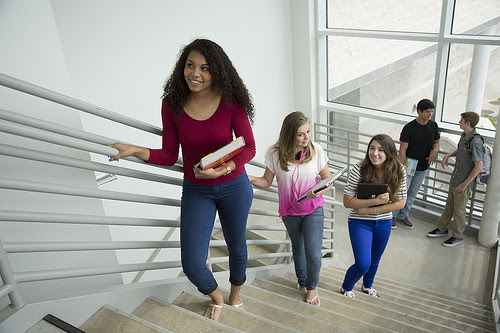Metacognition and Learning
More and more educational journals are talking about metacognition as the key to all genuine learning. Metacognition requires reflection on our thinking process.
Metacognition and Leadership Development

photo credit: NEC Corporation of America Education – Creative Commons via photopin(license)
I’ve written quite a bit about metacognition, lately. More and more educational journals are talking about it as the key to all genuine learning. Metacognition requires reflection on our thinking process. It demands that students “own” the issue in front of them and assume responsibility for the steps required to master it.
I love it when I meet a student who complains about something wrong on campus. I say this because complaints are often an invitation to discuss how the problem could be fixed and who might own the responsibility to fix it. When a student is upset enough to grumble about an injustice, it means they might just feel the emotion necessary to get involved. If not, I tell them to stop complaining. Robin is a perfect example. She came to me one school year, moaning about the program committee on campus that year. Once she finished articulating her complaint, I asked what she felt could be done about it. She hesitated, but then came up with a couple of ideas. I replied, “If you’ll take those on yourself, I will get behind you and make sure you have the support you need.” She balked at first, but then smiled. She suddenly felt empowered. No title. Just pure opportunity. That was the year Robin became a leader. She owned it. She practiced metacognition.
Simple Ideas to Ignite Metacognition in Students
If you’re an educator or a parent, there are simple ways you can begin enabling students to practice metacognition. Consider the list below to spark your own ideas:
1. Let students plan the entire lesson for a class (or plan a budget for family vacation) Experiences beat explanations any day.
2. Don’t answer your own questions. Let students work on resolving a problem or situation without offering a quick solution.
3. Invite the students to help each other prepare for an upcoming examination. Let them create the drills or games and own the content of the classroom.
4. Use images and stories. Young people engage more quickly when visuals are utilized. Dr. Len Sweet says: “Images are the language of the 21st century.”
5. Ask students to pick a topic or skill they think they have mastered. Then have them do a presentation on how they mastered the skill and what they learned in the process. Kids learn more when they expect to teach what they learn.
When I served college students in San Diego, Richard entered our department as a shy and quiet young adult. After getting acquainted, I felt he’d make a great study group leader, so I asked him about it. He refused. He didn’t feel qualified to do it. However, when I persuaded him to join a group (promising he didn’t even have to say anything profound) he agreed. All semester he built friendships. In December, I asked if he’d be willing to serve as an apprentice. He wouldn’t have to lead the group each week, just send reminders to attendees about snacks and meeting times. He agreed. Twice during that spring the group leader was out of town—and Richard had to take over. He was brilliant. The next fall, Richard was leading a small group. Within two years, Richard was leading all the small group leaders.
Leadership is within the reach of every student. It just requires some ownership.
-------
Written by Tim Elmore. See the full article at: https://growingleaders.com/blog/fastest-trick-develop-student-leaders/


